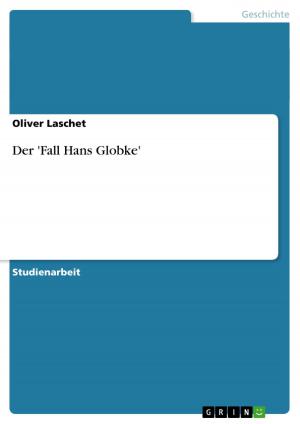| Author: | Annika Wildersch | ISBN: | 9783668103924 |
| Publisher: | GRIN Verlag | Publication: | December 7, 2015 |
| Imprint: | GRIN Verlag | Language: | English |
| Author: | Annika Wildersch |
| ISBN: | 9783668103924 |
| Publisher: | GRIN Verlag |
| Publication: | December 7, 2015 |
| Imprint: | GRIN Verlag |
| Language: | English |
Seminar paper from the year 2015 in the subject English Language and Literature Studies - Other, grade: 2,0, Humboldt-University of Berlin (Institut für Anglistik und Amerikanistik), course: Sprachwissenschaftliche Methoden und Englischunterricht, language: English, abstract: This term paper deals with the debate between two opposing viewpoints about the causation between language and cognition in the spatial domain. The first perspective is called linguistic relativity, which holds that the structure of a language influences the cognitive processes of the speakers and affects the ways in which they conceive the world. In other words, the principle of linguistic relativity claims that language shapes the way we think. This standpoint will be represented by articles from research groups around the linguists Eric Pederson and Stephen Levinson (Pederson et al., 1998; Levinson et al., 2002). The opposing stance contains the universalist notion that all languages are broadly similar and linguistic systems are merely the formal and expressive medium that speakers use to describe their mental representations. Hence, linguistic coding cannot have effects on cognition but reflects antecedently existing conceptual distinctions. This attitude is conveyed by the psychologists Peggy Li and Lila Gleitman (Li & Gleitman, 2002), who argue that 'it's the thought that counts' (ibid, 291). The paper is structured in the following way. To explain the basis of the debate, the main part opens with an introduction of the different frames of reference that are employed in distinct languages to convey spatial information. Next, Pederson's experiments and interpretations about the effect of spatial coding in language on cognition are presented. Then, a reinterpretation of these findings and further experiments by Li and Gleitman are outlined. Finally, a critical comment by Levinson on Li and Gleitman's analysis will show how he defends the position of linguistic relativity in the domain of spatial coding. In the concluding chapter of this paper, a summary of the debate will be provided, accompanied by a discussion about the transferability on the general relation between language and cognition.
Seminar paper from the year 2015 in the subject English Language and Literature Studies - Other, grade: 2,0, Humboldt-University of Berlin (Institut für Anglistik und Amerikanistik), course: Sprachwissenschaftliche Methoden und Englischunterricht, language: English, abstract: This term paper deals with the debate between two opposing viewpoints about the causation between language and cognition in the spatial domain. The first perspective is called linguistic relativity, which holds that the structure of a language influences the cognitive processes of the speakers and affects the ways in which they conceive the world. In other words, the principle of linguistic relativity claims that language shapes the way we think. This standpoint will be represented by articles from research groups around the linguists Eric Pederson and Stephen Levinson (Pederson et al., 1998; Levinson et al., 2002). The opposing stance contains the universalist notion that all languages are broadly similar and linguistic systems are merely the formal and expressive medium that speakers use to describe their mental representations. Hence, linguistic coding cannot have effects on cognition but reflects antecedently existing conceptual distinctions. This attitude is conveyed by the psychologists Peggy Li and Lila Gleitman (Li & Gleitman, 2002), who argue that 'it's the thought that counts' (ibid, 291). The paper is structured in the following way. To explain the basis of the debate, the main part opens with an introduction of the different frames of reference that are employed in distinct languages to convey spatial information. Next, Pederson's experiments and interpretations about the effect of spatial coding in language on cognition are presented. Then, a reinterpretation of these findings and further experiments by Li and Gleitman are outlined. Finally, a critical comment by Levinson on Li and Gleitman's analysis will show how he defends the position of linguistic relativity in the domain of spatial coding. In the concluding chapter of this paper, a summary of the debate will be provided, accompanied by a discussion about the transferability on the general relation between language and cognition.















